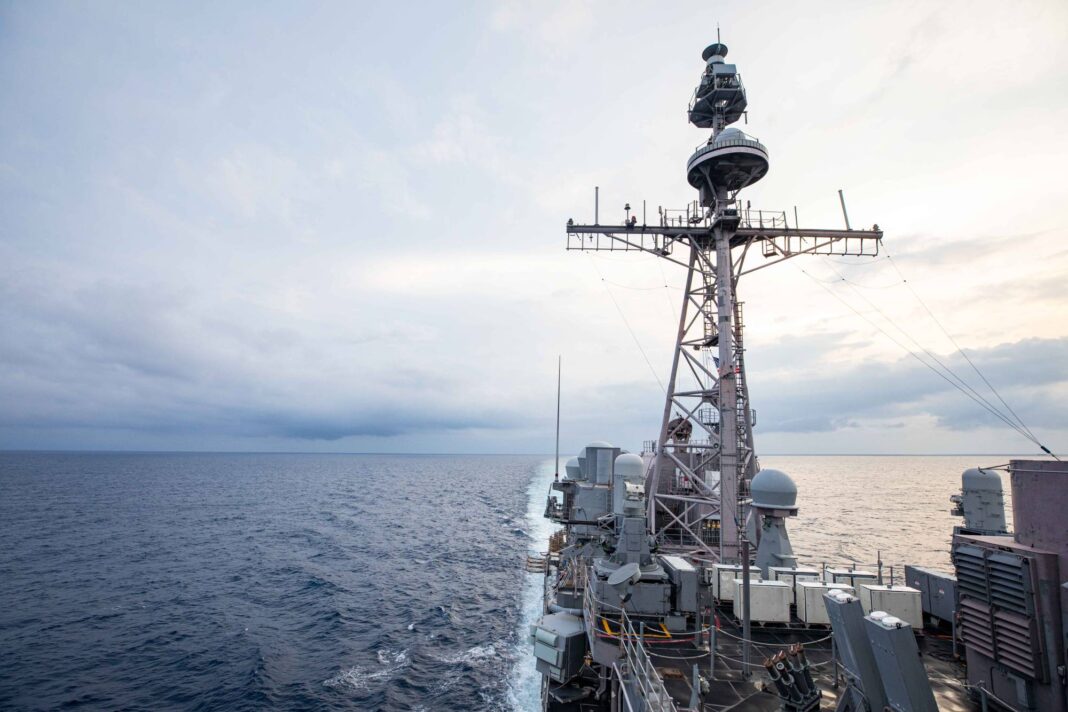Two U.S. Navy warships transited the Taiwan Strait on Sunday — the first such sailings since China held massive military exercises around Taiwan in response to a visit to the self-ruled island by U.S. House Speaker Nancy Pelosi.
The guided-missile cruisers USS Antietam and USS Chancellorsville conducted “a routine Taiwan Strait transit … through waters where high seas freedoms of navigation and overflight apply in accordance with international law,” a U.S. Navy 7th Fleet spokesperson told The Japan Times. “These ships transited through a corridor in the Strait that is beyond the territorial sea of any coastal State.”
The 7th Fleet said the ship’s transit through the Taiwan Strait “demonstrates the United States’ commitment to a free and open Indo-Pacific. The United States military flies, sails, and operates anywhere international law allows.”
Taiwan’s Defense Ministry also confirmed the transit, saying the two U.S. warships had sailed south through the strait and that the situation in the surrounding waters and airspace was “normal.”
A spokesman for the Chinese military’s Eastern Theater Command slammed the U.S. for hyping the warships’ sailing, saying that the entire operation had been monitored.
“Theater forces remain on high alert, ready to thwart any provocation,” Senior Col. Shi Yi said in a statement posted to the Chinese Defense Ministry’s website. The Chinese military has in the past tailed and monitored U.S. warships transiting the strait, raising fears of a potential miscalculation.
The Sino-U.S. rivalry has heated up in the wake of Pelosi’s visit to Taiwan and China’s large-scale military exercises around the island. Those exercises saw Chinese People’s Liberation Army (PLA) warplanes regularly cross the so-called median line of the Taiwan Strait, some 40 kilometers from Taiwan, and included missile launches that overflew the island for the first time ever. Those missiles landed in waters near Japan’s far-flung southwestern islands — another first.
Euan Graham, a senior fellow for Asia-Pacific security at the International Institute for Strategic Studies think tank, said that Sunday’s transit of the Taiwan Strait “looks like a show of force on one level that the U.S. has not been deterred by recent PLA efforts to challenge the median line and to assert jurisdiction throughout the strait.”
The U.S. Navy regularly sends ships through the Taiwan Strait, and the top American diplomat for Asia pledged earlier this month that the military will continue to operate there, saying that any moves by China to prevent the operations would be “deeply destabilizing,” after Beijing’s ambassador to Washington warned against such a move.
The sailings were not a break from precedent, observers said. The U.S. Navy has sent two warships through the strait in recent years, including a dispatch of the Antietam and USS Curtis Wilbur in October 2018; the USS William P. Lawrence and USS Stethem in April 2019; and the Wilbur and USS John S. McCain in December 2020.
Chinese officials have in recent months asserted that Beijing has “sovereignty, sovereign rights and jurisdiction over the Taiwan Strait.” This new talking point has stoked questions about whether China could more actively confront U.S. and allied naval vessels in the strait.
According to the United Nations Convention on the Law of the Sea, a country’s territorial waters extend 12 nautical miles (22 km) from its shores, while an exclusive economic zone (EEZ) extends up to 200 nautical miles (370 km). Countries have sovereign rights to explore, exploit, conserve and manage natural resources, as well as jurisdiction to engage in specific activities. However, these do not include regulating the passage or activities of foreign vessels and aircraft in its EEZ unless those activities infringe on the sovereign rights enumerated by UNCLOS.
The Taiwan Strait is a key trade artery that has seen almost half of the global container fleet and 88% of the world’s largest ships by tonnage pass through it this year, according to data compiled by Bloomberg. It is also the primary route for ships sailing from China, Japan, South Korea and Taiwan to markets in Europe, the U.S. and all stops in between — a point that U.S. officials have emphasized.
Julian Ku, a law professor at Hofstra University and longtime China watcher, said that Sunday’s sailing and the language employed by the 7th Fleet was an attempt to clarify that the U.S. is not infringing on anyone’s territorial seas, and that the move “will force China to clarify its position — does China think merely transiting exclusive economic zones violates its sovereignty?”
China considers democratically ruled Taiwan to be one of its unassailable “core interests” that must be brought back into the fold, by force if necessary. Washington, on the other hand, officially recognizes Beijing rather than Taipei under its long-standing “One China” policy, though the U.S. is also bound by the Taiwan Relations Act to provide the island with the means to defend itself. China has cited Pelosi’s trip as evidence of what it calls the “hollowing out” of this policy.

